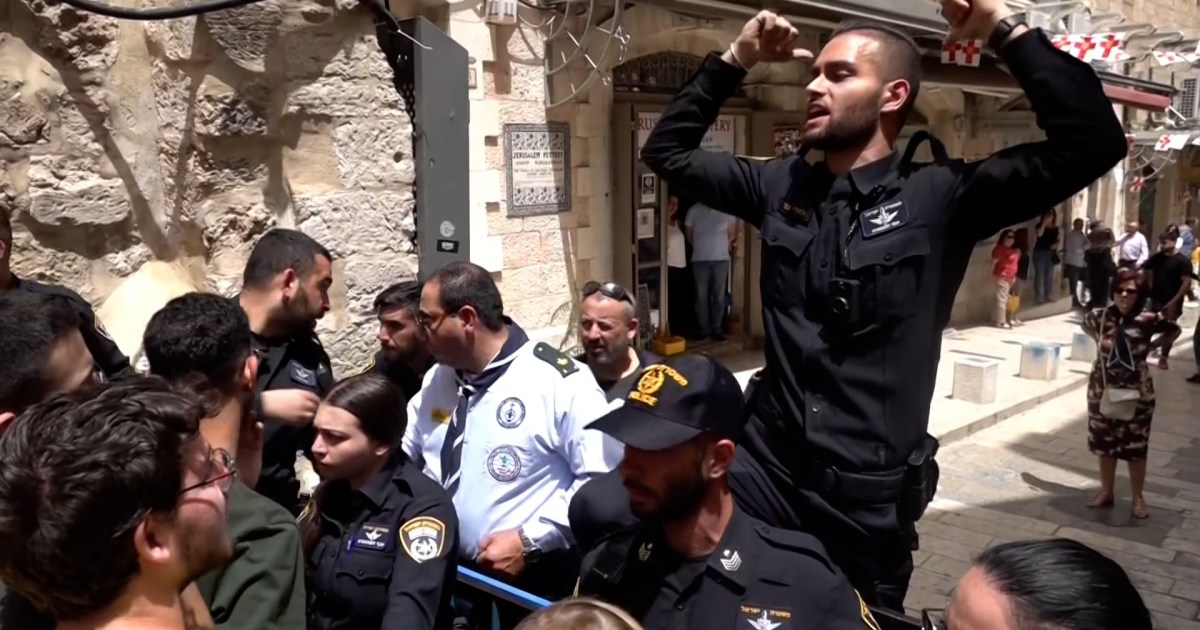The measures of the Israeli occupation obstructed the arrival of Christian worshipers to the Church of the Holy Sepulcher to celebrate the Holy Saturday of the Christian denominations that follow the Eastern calendar.
Checkpoints were erected at the entrances to the Old City, specifically Bab al-Jadeed, near the Church of the Holy Sepulcher, impeding the arrival of many families, tourists and citizens coming from all over the West Bank and areas inside the Green Line.
The Palestinian Authority and the Orthodox institutions considered this a blatant violation of freedom of worship.
Anadolu Agency quoted eyewitnesses as saying that the Israeli police beat Christians who tried to reach the Church of the Holy Sepulcher, but no injuries were reported.
According to witnesses, Israeli restrictions hindered the arrival of other numbers of Palestinian Christians to the church, and there were several skirmishes between the police and revelers at the checkpoints imposed by the police in the city.
Factions denounced
The Palestinian factions rejected the violations of the occupation forces in the Church of the Holy Sepulcher, and the Islamic Resistance Movement (Hamas) called on the international community to pressure the occupation authorities to stop its policies that constitute a flagrant violation of human rights and international law.
The movement stressed that the occupation’s imposition of restrictions on the celebrations of Palestinian Christians on Holy Saturday is considered racist occupation measures and a flagrant violation of freedom of worship and holy places.
The Islamic Jihad movement also denounced what it described as a blatant aggression against the freedom of worship and the practice of religious rites for the Christians of Palestine.
She added that "the occupation, with its terrorist policy, targets all the Palestinian people, and violates Islamic and Christian sanctities," according to the movement's statement.
In turn, the Popular Front for the Liberation of Palestine condemned the occupation's restrictions on Christian worshipers, and said that these measures come within the framework of the systematic targeting of the holy sites in the city of Jerusalem.
The Front considered that these restrictions are one of the chapters of the plans to Judaize the city of Jerusalem and its Islamic and Christian holy sites, and stressed the need to continue the pressing national and popular movement to confront what it described as the aggression of the occupation and settlers and their permanent desecration and desecration of holy sites.
crossing closure
On the other hand, the Israeli authorities decided to close the Beit Hanoun crossing with the Gaza Strip, tomorrow, Sunday, to the movement of merchants and workers in the Strip working in Israel, and this came in response to the firing of rockets from the Strip towards Israel.
Meanwhile, the coordinator of the Israeli government's operations in the occupied territories, Ghassan Alyan, announced that the decision to open the crossing is conditional on the return of calm and an assessment of the security and military situation.
Commenting on Israel's decision to close the Beit Hanoun crossing, Maher Al-Tabbaa, acting director of the Gaza Chamber of Commerce, said - in an interview with Al Jazeera - that the losses of the residents of the Gaza Strip as a result of the closure will be painful, and will contribute to complicating the economic conditions of the Palestinians.

